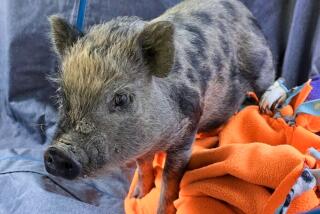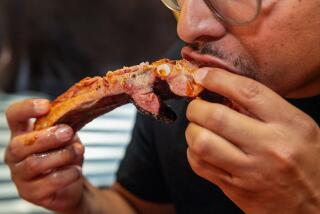First-Rate Fuss Over a Cut-Rate Porker : Pets: Randy Jahelka found himself on the wrong side of the law when he brought Hamburger home. The pig craze is over, but not the legal fuss over them.
- Share via
GLENDALE — Potbellied pigs have become a bit passe as pets these days, and in some areas so has the fuss that once surrounded them.
Prices for the pigs have fallen from $1,500 a couple of years ago to a tenth of that--or less--now. That made it easy for Randy Jahelka to buy one; he picked up black-haired Hamburger at a La Crescenta pet store for $100 in October.
But the pig craze that swept California during the past several years somehow missed Glendale, with the result that Jahelka finds himself at the vanguard of pig ownership in his hometown--with all the attendant headaches.
Jahelka is fighting to hold onto Hamburger after a neighbor squealed on him for raising the pig in violation of a Glendale law that prohibits residents from owning farm animals.
“I’m not trying to create any problems with the city,” Jahelka said. “But the pig is my friend.”
Potbelly breeders and faddists have persuaded at least 24 California cities to amend zoning ordinances to permit the animals. In addition to unincorporated areas of Los Angeles County, the cities of La Habra Heights, Beverly Hills and Burbank have legalized them.
Now, Jahelka plans to ask the Glendale City Council to reclassify the small pigs, which weigh in at 100 pounds or so, as pets.
The trouble began in late January when neighbor Judy Calame reported Hamburger to the Glendale Humane Society, which enforces animal control in the city. The Humane Society admonished Jahelka to relocate the pig outside city boundaries but has agreed to wait until the council deliberates. Jahelka has not yet brought his grievance before the council.
Jahelka, 32, lives with his girlfriend and her two children on a suburban-sized lot in a semirural area at the foot of the San Gabriel Mountains. They share their dwelling with a rabbit, a dog, a cat--and 70 pounds of Hamburger. At any given time, a visitor is likely to find shifting combinations of pets milling indoors or out in the yard.
“They throw all their junk back there,” said Calame, who owns five cats and keeps a horse--off her property. “When the sun comes out, you can smell it a mile away.”
Councilwoman Eileen Givens hasn’t met any potbellies yet but doesn’t count herself as among their fans. “I personally don’t want one,” she said. “My gut feeling is that it’s a little too exotic for Glendale.”
Jahelka hopes to turn those sentiments around with the help of the Los Angeles Potbelly Pig Assn.
In a letter that Jahelka plans to bring to the council, group director Phyllis Frisbey wrote that Vietnamese potbellies “are considered the third most intelligent animal behind dolphins and primates. Several years ago they were on the threatened species list. They provide no public health hazard as indicated by our material from the California State Dept. of Health.”
Hamburger needs all the support he can get. Registration records show he has had three homes in less than a year. Not that he’s alone. As the novelty wears off but up to 100 pounds of pig stays on, potbelly owners increasingly are abandoning their pets, dropping them off at animal shelters or even cooking them, pig advocates say.
Vietnamese potbellies in this country descend from the herd of a Canadian breeder named Keith Connel, who imported 18 of the miniature pigs in 1985 from Sweden. Today, the Potbellied Pig Registry in Indiana--one of two that are nationally recognized--has counted more than 19,000 in the United States.
Potbellies originated in Southeast Asia, where their pork is appreciated more than their intelligence. Joe Sykora, supervisor of animal control at the Glendale Humane Society, encountered the pigs when he served in that area with the Air Force during the 1970s. “They run up to 150 pounds,” he said. “They fed an average village of 40 people in Thailand.”
Hamburger, however, is not destined for Jahelka’s dinner table.
Jahelka decided to buy the potbelly when his girlfriend’s daughter craved one after reading E.B. White’s 1952 book “Charlotte’s Web,” a children’s classic that explores the friendship between a pig and a spider who ultimately saves the pig’s life.
“We couldn’t let Ham die,” Jahelka said.
More to Read
Sign up for Essential California
The most important California stories and recommendations in your inbox every morning.
You may occasionally receive promotional content from the Los Angeles Times.










